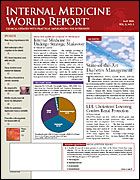Publication
Article
Internal Medicine World Report
Antibiotics May Help the Fight Against HIV-Associated Dementia
Author(s):
From the American Academy of Neurology
SAN DIEGO—The antibiotic ceftriaxone (Rocephin) has been shown useful in preventing dementia in patients with HIV, investigators reported at the 2006 annual meeting of the American Academy of Neurology.
Patients with HIV infection often develop dementia as part of their illness, and this problem is expected to become even more severe as infected patients continue to live longer.
Implicated in the development of HIV dementia are 2 HIV proteins—Tat and gp 120. One effect of these proteins is to reduce the expression of the neuronal membrane receptor, excitatory amino acid transporter-2 (EAAT-2). This receptor absorbs the neurotransmitter glutamate from the space between neurons, thereby preventing the excess neuronal excitation that can cause cell death.
Researchers now postulate that HIV proteins increase brain damage by reducing EAAT-2, which subsequently leads to dementia.
The antibiotic ceftriaxone (Rocephin) is a known stimulator of EAAT-2 expression that has been shown to protect against neuronal injury in animal models of other disease states, such as motor neuron disease.
To test its potential in HIV, investigators created human neuronal cell cultures and treated them with ceftriaxone. The cell cultures were then exposed to Tat or gp 120 proteins. Results showed that ceftriaxone protected the neurons against both HIV proteins.
“The standard dose of ceftriaxone for bacterial meningitis…is 2 g every 12 hours. So that would probably be the dose for an initial trial, and if it becomes clinically useful, it would probably involve chronic use,” said lead investigator Jeffrey Rumbaugh, MD, PhD, assistant professor of neurology, Johns Hopkins School of Medicine, Baltimore. “My coinvestigators are now trying to manipulate these types of antibiotics so that they maintain their neuroprotective effect but don’t have the antibiotic effect due to the current problem with antibiotic resistance.”
“We have focused on ceftriaxone because of its known ability to penetrate the blood-brain barrier....Ideally, we would hope that this type of agent could be used to both treat and prevent HIV-related dementia.”
—Jeffrey Rumbaugh, MD, PhD
Many of the antibiotics in the beta-lactam class, such as the cephalosporins and penicillins, may be good candidates and have shown benefits in various neuroprotective assays, according to Dr Rumbaugh.
IMWR
“We have focused on ceftriaxone because of its known ability to penetrate the blood-brain barrier,” he said. “Perhaps by altering the side chains on the beta-lactam ring, we can increase the neuroprotective effect, decrease the antibiotic effect, and maybe even develop an oral formulation. Ideally, we would hope that this type of agent could be used to both treat and prevent HIV-related dementia,” Dr Rumbaugh told . “That is something that still needs to be studied, and that is something we will not be able to answer for some time.”
He emphasized he was not aware of such a use of antibiotics in clinical practice. “I don’t recommend prescribing ceftriaxone based on the data we have now,” he said, “although in a patient who is severely demented and doesn’t really have anything to lose, I suppose it might be something you could consider. I say this not only because of my study, but because of some other studies that have shown it has good neuroprotective effects in a variety of different models.”





